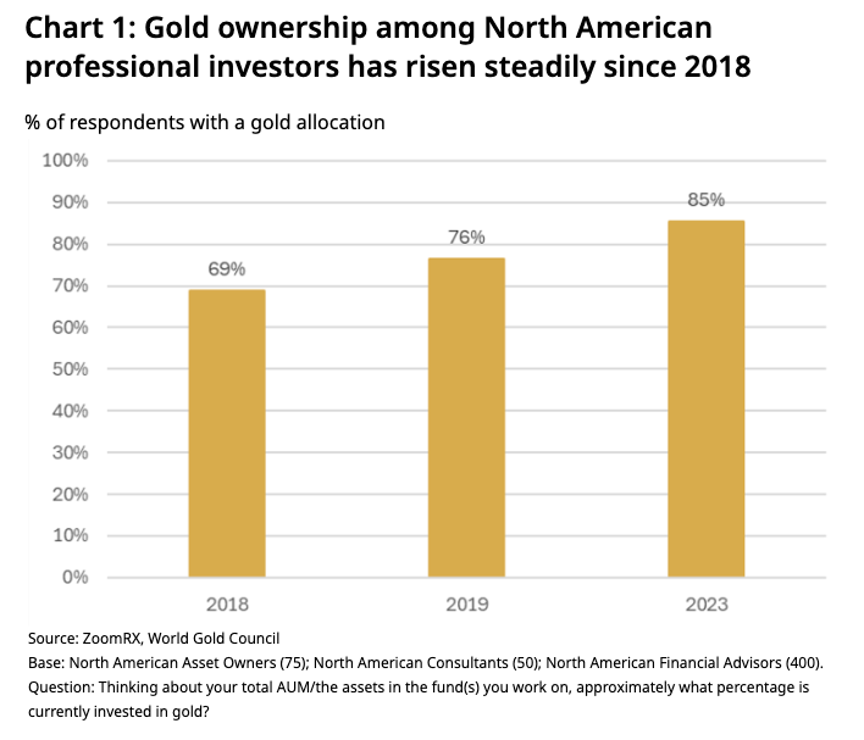Despite the generally negative attitude toward gold you hear in the mainstream financial media, the vast majority of professional investors in North America own gold and the number has been growing in recent years.
A World Gold Council survey of 525 North American investors found a steadily growing trend of gold ownership. The survey included large institutions, consultants, and financial advisors.
In 2018, 69 percent of the survey respondents said they had some allocation to gold. In the most recent survey, 85 percent reported owning some gold.

Given all of the negative talk we hear about gold in the financial media, this seems like an exceptionally high number. But digging in deeper, we find that just over a quarter of the investors who reported owning gold hold less than 1 percent of assets under management in the yellow metal.
About half of the respondents said they held at least 1 percent of their portfolio in gold. About 24 percent have an allocation of 3 percent or more.
Over one-quarter of respondents said they plan to increase gold allocations in the next 12 to 18 months. That was more than double the number who said they plan to reduce their exposure to gold.
According to the World Gold Council,
“At the aggregate level, North American investors seem likely to increase their allocations to gold over the year ahead. We recently flagged that gold is historically under-owned in the U.S., signaling the potential for headroom and supporting a positive outlook for gold ownership.”
The reasons these investors reported holding gold include its role as a portfolio diversifier and as a hedge against inflation. They also reported that they believe holding gold decreases portfolio risk.
Gold’s role as a “proven diversifier, especially in periods of financial turmoil and economic uncertainty” was the most commonly cited reason for increasing gold allocations with 46 percent of the sample choosing it as one of their top three reasons for holding gold.
But the survey revealed that professional investors aren’t aware of gold’s solid long-term returns. Sixty percent of the respondents said gold tends to deliver less than sparkling returns compared to other asset classes.
In fact, gold has outperformed most asset classes over the last 25 years. In fact, with an average 8 percent return each year, gold has outperformed equities over the last quarter century.
About 21 percent of the survey respondents acknowledged that gold delivers “excellent” comparative long-term returns.
According to the survey, a lot of professional investors also fail to grasp gold’s liquidity. Just under half of respondents agreed that gold is a liquid asset. Almost a quarter of respondents with no gold holdings cited liquidity as a barrier to investing in gold.
Again, the perception doesn’t match up with reality. In fact, the gold market is more liquid than several major financial markets, including the euro/yen and the Dow Jones Industrial Average. The trading volume for gold averaged approximately $163 billion per day in 2023.
One of the things that makes gold so liquid is the fact that it is valued around the world. Whether you go to Europe, Asia, or South America, people recognize gold as a store of value. You will never be left without a buyer if you want to sell gold.
The survey shows that there are plenty of misconceptions about gold within the investment community, but despite the generally negative messaging in the financial media, most professional investors in North America do recognize the value of holding at least a small amount of gold within their portfolios.

